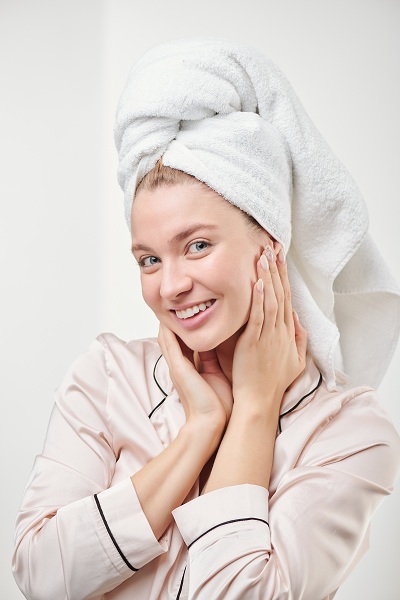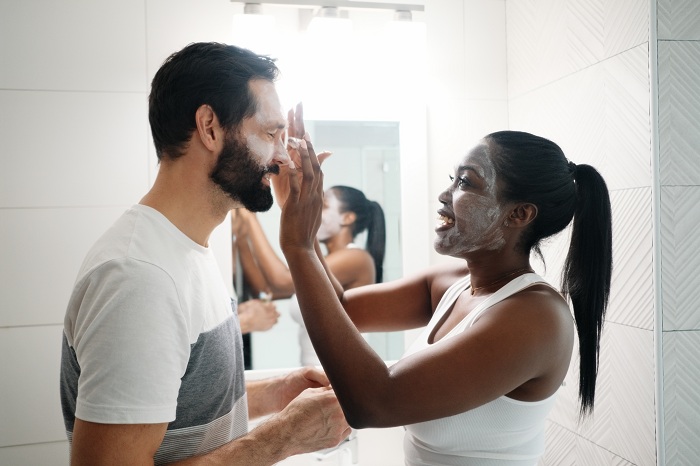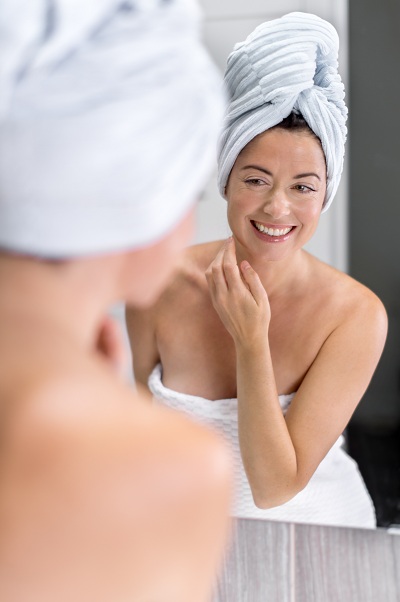Not only is oatmeal a breakfast staple, but this natural ingredient offers up a whole host of benefits when used topically, making it a skin care superstar too.
While you could slather your skin with the oats you have in the kitchen, colloidal oatmeal is the form of oatmeal that you need to know about. Let’s find out more about this wonder ingredient…
Contents
What is Colloidal Oatmeal?
Colloidal oatmeal consists of oat grains that have been ground into a fine powder. This is then boiled to create a nourishing extract that’s packed with numerous vitamins, minerals, natural oils, and antioxidant properties.
As you can imagine, this allows the ingredient to offer numerous skin and health benefits.
7 Benefits of Oatmeal for Your Skin

So, would colloidal oatmeal help your skin? The answer is yes – no matter your skin type or the skin concerns you’re dealing with, oatmeal will likely be able to boost your skin’s overall health. Here are some of the main oatmeal benefits for skin:
Keeps the Skin Hydrated and Moisturized
Moisture is something that everyone’s skin needs – skin cells simply can’t survive without it.
Some ingredients are better at keeping the skin hydrated than others, and oatmeal is one of these.
Studies show that oatmeal products significantly improve skin hydration and decrease skin dryness, with effects lasting for up to 24 hours post-use [1].
This is all thanks to the ingredient’s emollient properties – it fills in those tiny cracks in your skin that would have otherwise allowed moisture to escape.
However, it also contains vitamin E – an ingredient reputed for its moisturizing effects on dry skin.
Can Treat Itching and Irritated Skin
As mentioned, oatmeal is incredibly hydrating, which in itself is great for soothing itching and skin irritation. However, that’s not all it does – oatmeal can also reduce skin inflammation, which helps to stop the itch. This is what makes oatmeal such a popular home remedy for chicken pox!
Likewise, when it comes to other skin conditions that cause itchy skin, such as eczema and psoriasis, oatmeal can help too.
Acts as a Natural Cleanser & Gently Exfoliates Dead Skin Cells

The oat grain contains compounds called saponins, which are natural cleansing agents. These not only remove dirt and excess oil from the surface of the skin, but they clear out the pores too, which is great for those with acne.
Even better, those same saponins target dead cells as well, making them a fantastic exfoliant.
Protects the Skin from Environmental Damage
UV rays, harsh pollutants, chemicals in cosmetics – there are so many environmental factors out there that damage the skin. What you need is a skin protectant, which is where oatmeal comes in.
The flavonoids in oatmeal not only absorb UVA rays, but they also support your skin’s protective barrier to prevent other forms of environmental damage.
One study even found that oatmeal was capable of protecting the skin from the irritation and damage caused by sodium lauryl sulphate (SLS), a common ingredient in many hair and skincare products [2].
Can Lighten Skin Discoloration
Although science hasn’t yet confirmed it, many have had success in using oatmeal to lighten dark spots and brighten skin complexion.

This could be because oatmeal contains a number of skin-brightening compounds, including amino acids and vitamin B, enabling it to tackle hyperpigmentation.
Related: see our Top 5 Best Skin Lightening Cream Products
Anti-Aging Properties
Remember that study we mentioned earlier regarding oatmeal skincare products and skin hydration?
Turns out, while measuring moisture levels, researchers also discovered that those same oatmeal ingredients had also given skin elasticity a boost, resulting in a tighter and bouncier finish.
This is due to the ingredient’s antioxidant and anti-inflammatory properties. The antioxidants (which include ferulic and caffeic acids) help to boost elastin and collagen production, while the anti-inflammatory compounds protect those precious protein fibers from damage.
It’s the perfect anti-aging combination, all in one ingredient!
Safe for All Skin Types, Including Sensitive Skin
There aren’t many ingredients out there that are safe for all skin types, but oatmeal is one of them. It’s known for being extremely gentle – it can even be used on a baby’s delicate skin.
Not only does it promise not to aggravate even the most sensitive skin, oatmeal will even take things a step further and soothe those sensitivities, reducing skin inflammation to leave the skin balanced and happy.
How to Add Oatmeal to Your Skincare Routine
There are several ways to add oatmeal to your daily routine, but here are some of the most popular:

- An Oatmeal Bath – Oatmeal baths have been used for centuries. They allow your entire body to experience the benefits of oatmeal. Simply fill a tub with warm water, pouring one cup of oatmeal and a small amount of baking soda in at the same time. Soak in the water for 10 minutes. If your body feels sticky after, rinse with cool water, before applying a body balm (like InvisiCrepe Body Balm) or cream.
- An Oatmeal Cleanser – mix half a cup of raw oats with one third cup of boiling water to form a thick paste. Massage this into your skin and then rinse with warm water.
- An Oatmeal Face Mask – Mix one tablespoon of honey with two cups of oatmeal, and add in some milk to loosen the texture. Apply this to your skin and then rinse off after 15 minutes.
- Oatmeal Skincare Products – if DIY skin care isn’t your thing, look into ready-made skin care products that contain oatmeal. From cleansers to serums to moisturizers, you’ll find this ingredient in so many formulas.
Does Colloidal Oatmeal Have Any Side Effects?
There aren’t really any side effects associated with colloidal oatmeal, apart from allergic reactions. If you have an oat allergy, then seek professional medical advice before using oatmeal on your skin.
FAQs
What does oatmeal do to your face?
There are so many benefits of oatmeal for your face – it’ll cleanse, brighten, soothe, soften, and tighten your skin.
Does oatmeal lighten skin?
Oatmeal can potentially help to lighten dark spots, but it won’t lighten your natural skin color.
Can I use oatmeal on my face every day?
Yes! Oatmeal is gentle enough to be used on the face every day.
Conclusion
Oatmeal is an ingredient that can pretty much do it all. Whether your skin is dry and itchy, oily and acne-prone, or a combination of the two, with fine lines and wrinkles starting to show, oatmeal can help.
Give this ingredient a try and it won’t be long before this kitchen staple soon becomes your favorite skincare staple too!
References
[1] https://www.cdriadvlkn.org/article.asp?issn=2542-551X;year=2018;volume=2;issue=2;spage=58;epage=63;aulast=Sacchidanand
[2] https://www.researchgate.net/publication/11494180_Modulating_Effects_of_Oatmeal_Extracts_in_the_Sodium_Lauryl_Sulfate_Skin_Irritancy_Model